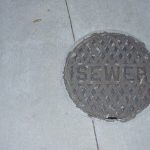We all rely on our plumbing system to bring fresh water into our homes and take the wastewater away. Many people experience very few problems with their up to date plumbing systems except for the occasional leak or a blocked toilet. But, for owners of older homes, this may not be the case; older plumbing pipes affect the performance of your overall plumbing system. When the pipes are aging, they are more likely fail, and they may even be made of out of date materials that are not up to modern plumbing standards. Let’s take a closer look at how older plumbing pipes can be a liability in your home.
4 Plumbing Pipe Materials
A modern plumbing system is typically comprised of cross-linked polyethylene or PEX or copper pipes. These materials are safe to use, they don’t leach into the carried water, and they are easy to work with. In the past, the materials used in plumbing system were less than ideal, and it’s only through hindsight that we can see how bad they were. Many of these materials are still in use in older homes throughout the country, and they can still cause problems to this day. These aging plumbing pipes made from less than optimal materials could be leaching contaminants into the water and corroding to make the pipes unhealthy to use and more likely to become compromised. Let’s take a look at four of these poor plumbing materials and the problems commonly associated with using them in your home plumbing system.
- Lead
This is probably the worst plumbing material, it’s toxic in any concentration, and it will leach into any water carried through the pipe. Lead pipes were still being installed in homes as late as the 1980s despite a number of health concerns. Lead solder was also extensively used, and this can easily leak into the carried water if any corrosion has occurred. Exposure to lead over a prolonged period of time can affect the nervous system, lead to learning difficulties in children, and in high concentrations, it can be fatal.
- Cast Iron
Many homeowners installed cast iron pipes to replace the aging lumber tubes in their plumbing systems. These pipes were primarily used for large industrial processes and hydraulic systems, and they were later adopted for domestic plumbing applications. Cast iron is an extremely durable material that did last for decades, but now these plumbing pipes are starting to corrode, and this can release rusty iron particles into the drinking water supply.
- Galvanized Steel
This was a popular material for plumbing pipes from the 1880s up until the late 1960s. It was marketed as the ideal replacement for lead pipes, and it was eventually superseded in popularity by copper. During the manufacturing process, the steel pipes are dipped in zinc to make them more resistant to corrosion. But, the zinc coating contains lead and other hazardous toxic materials, making it dangerous to use. Galvanized pipes have a useful lifespan of around 50 years before they began to corrode and break down. So, if you have galvanized steel pipes in your home, they are likely to be in poor shape.
- Copper
The use of copper pipes first appeared after World War I, and they became increasingly popular in the decades that followed. Cooper piping is versatile and easy to work with, and it’s still a popular choice as a plumbing pipe material to this day. The main problem with older copper plumbing system was the lead solder used on the joints. So, if you have older copper pipes, you could be exposed to lead poisoning from this soldering material. Copper piping can be recycled, and modern copper piping is soldered without using lead. Copper is less attractive as a material now because it’s expensive, and many people prefer to install more affordable PEX pipes instead.
4 Common Older Plumbing Pipe Problems
As well as the leaching of harmful contaminants, corrosion, rust, and poor performance, there are other common problems associated with older plumbing pipes.
- Persistant Clogs
When plumbing pipes are old and outdated, they are more susceptible to persistent clogs that seem to return with alarming frequency. These clogs can be kept at bay with regular drain clearing, but every a certified professional plumber can only do so much. Over the lifespan of a plumbing system, the pipes will accumulate a great deal of debris, such as sand, sediment, grit, grease, and grime that are lodging in hard to reach locations. If professional cleaning cannot prevent these clogs from returning it’s time to update your plumbing pipes.
- Cloudy Tap Water
If the water coming out of your tap is cloudy, turbid and dirty in appearance, this is not normal. This can be caused by high water pressure, but if the water has an orange or brown tint, it may be rusty due to corrosion in the plumbing pipes. If you notice that you have discolored water contact your local certified plumber for expert help and advice.
- Frequent Minor Leaks
If you have minor leaks causing moisture in your basement and other locations it can be a warning of worse problems to come. The water held in your plumbing pipes is kept under pressure, and if the pipe is compromised, it can easily cause a leak. A minor leak may seem like a small issue, but even a tiny leak can release a large volume of water over time. Water damage is expensive to fix, and it will only get worse over time.
- Burst Pipes
Smaller water leaks or cracks in the plumbing pipes can develop into a pipe collapse, and this can release a large volume of water in a very short period of time. The basement may flood until the water is shut off at the main valve and if you’re not at home, the water could be flooding your home for some time. This can cause a great deal of damage to your home, and it may even compromise the foundations.
An aging plumbing system can be toxic, and it may even cause damage to your home that’s expensive to fix. If you suspect that your plumbing pipes are not up to modern standards, contact your
local certified plumber for expert help and advice.
By Giovanni Longo President Flood Brothers Plumbing
Giovanni Longo is a 3rd generation master plumber who has been practicing his craft and trade in the greater Los Angeles area for well over a decade and a half. A plumbing and hydraulics-engineering innovator, Giovanni’s particular world-class expertise focuses on dealing with challenging sewer system designs as well as resolving complex commercial and residential draining issues. As a certified Flood Mitigation expert, he is also well versed in a wide variety of water damage and remediation solution.





